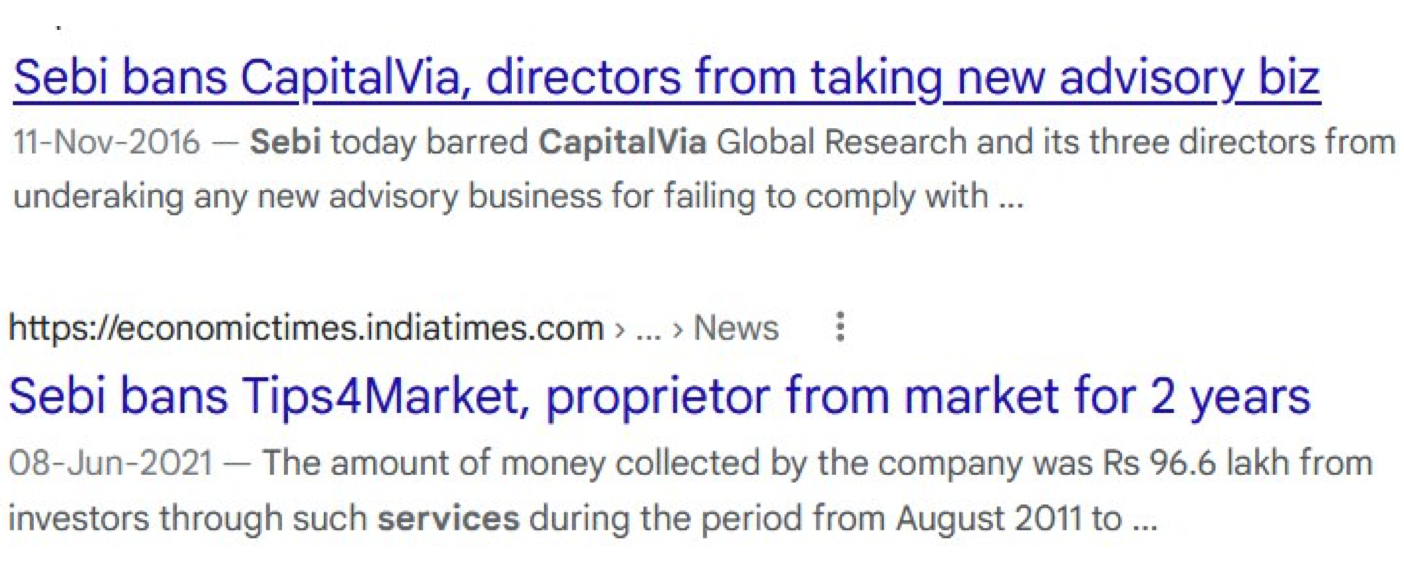
- December 12, 2021
- admin
- 6
There has been a lot of noise in social media in the last few days due to SEBI’s consultation paper on Algorithmic Trading by Retail Investors. One set of groups is completely against this consultation paper as they claim SEBI is going to ban algo trading completely and another set of groups welcomes the regulatory norms for Algo trading. In this article, we shall analyze the consultation paper in detail and we shall express what are the possible outcomes from SEBI in the next two months. If you are already doing algo trading individually or a subscriber of third party algo trading systems or running your own algo trading business, the following information could provide some clarity.

Era before Algo Trading:
Before algo trading came into picture, if you ask SEBI what annoys them the most, they would answer it is the “rise of Advisory Firms”. Between 2006 to 2012, there were a lot of advisory firms that started providing tips service with a claim of guaranteed returns. Many first time traders/investors fell for this trap and lost a ton of money. So SEBI’s IA Regulations came into effect from April 21, 2013 to protect retail investors falling for such tips service and they banned a lot of such unregistered advisory companies.

Algo Trading Era:
With 7 crores demat accounts in India which is growing rapidly every month, tons of new traders are coming into markets who want to get rich quick and most of these traders are looking for automated software which can trade for them and make high returns. And all these old advisory companies are obsolete now, no one wanted to rely on some SMS tips and trade based on that. So these advisory companies and new age Indore companies started Algo Trading marketing gimmick with ads like below which guarantees every day profit, high accuracy & assured returns.

Since these buy/sell recommendations are done through software, they don’t come under IA/RA regulations using this loophole many companies lure first time investors with assured profits. People who lost money with these platforms complained to SEBI and in the last two years these complaints related to algo trading have grown multi fold. The main concerns for SEBI are
- Algo Trading companies providing assured returns and fake promises
- Algo Trading companies which have a large user base can cause systematic risk to the market, as they can fire large numbers of orders in a short span of time on multiple users accounts in a few seconds which can move the markets.
- Algo Trading market place model where anyone can create a strategy and list it for subscription. Strategies that are claiming to make 200% – 300% in backtest which are mostly curve fitted but end users who don’t have knowledge on systems trading fall for it.
- Execution without education. No matter what kind of trading system is given by these algo trading companies, if their user base is not educated enough on mechanical trading systems with parameters like what is drawdown? the ideal money management rules, risk management, losing streaks etc then it does no good to users.
So in order to regulate algo trading SEBI proposed a certain framework and asked for public opinion. Let’s look at what SEBI has proposed.
All orders emanating from an API should be treated as an algo order and be subject to control by stock broker and the APIs to carry out Algo trading should be tagged with the unique algo ID provided by the Stock Exchange granting approval for the algo.
- SEBI basically wanted a mechanism to track manual orders and algo orders separately, they wanted the broker to come up with a Unique ID for orders generated from API. This is definitely possible at the broker’s end. If a broker wanted to segregate the algo orders and manual orders, they can do it.
Stock brokers need to take approval of all algos from the Exchange. Each Algo strategy, whether used by broker or client, has to be approved by Exchange and as is the current practice, each algo strategy has to be certified by Certified Information Systems Auditor (CISA)/ Diploma in Information System Audit (DISA) auditors.
2. This is highly impossible. No Stock broker would want to take this headache, this is really a cumbersome process which needs a lot of resources from the broker’s end. And companies like Zerodha which has only 0.5% of its user base into API based trading, would not want to spend their time and energy in the approval process. All API’s that are currently in the markets provided by different brokers are already approved by exchanges and the risk management is same for both API and manual orders, hence no matter what kind of strategy one uses, there is no way to manipulate or move the markets through API orders from an individual account. So getting approval for algo strategy makes no sense at all. Mostly SEBI will not impose this rule.
Stock Exchanges have to develop a system to ensure that only those algos which are approved by the Exchange and having unique algo ID provided by the Exchange are being deployed. Brokers shall also deploy suitable technological tools to ensure that appropriate checks are in place to prevent unauthorized altering/tweaking of algos.
3. More than the Algo strategy SEBI is worried about execution logic. They do not want any algos to fire lakhs of orders and load the exchange. But this framework is already in place with most of the API providers. You cannot place tons of orders through Algo Trading as brokers restricts max 200 order placement per minute. So necessary risk management principles are being followed by brokers already which potentially avoids large firing of orders.
All algos developed by any entity have to run on the servers of brokers wherein the broker has control of client orders, order confirmations, margin information etc.
4. Just like I mentioned earlier in point 2, this is again highly impossible for two reasons. One, most brokers do not want increase their infrastructure cost in managing servers for lacs of customers to run their algos and secondly, most traders do not want to run their strategies at brokers end, as they don’t want to disclose their strategies and if something goes wrong in the middle during market hours, running the strategies at brokers will provide no control to the traders, so they might not even able to stop it. It’s like losing complete control over yourself which no traders wanted to do.
Stock brokers need to have adequate checks in place so that the algo performs in a controlled manner.
5. These checks are already in place by most of the brokers as they have strict restrictions on how algos place orders.
Stock brokers can either provide in-house algo strategies developed by an approved vendor or outsource the services of third party algo provider/vendor by entering into a formal agreement with each third party algo provider/vendor whose services are being availed by the broker.
6. This is a welcome move, most brokers wanted to boost their business by having tie up with third party algo providers. Companies like Angel Broking, Aliceblue are already doing it by launching Smart Store, Trade store etc where they enter into formal agreement with third party providers after doing due diligence. Such agreements ensure complete transparency and traders also gain confidence when their own broker recommends such algo service. So by entering into a partnership agreement between brokers and algo providers, it already becomes regulated as these algo providers cannot advertise with assured returns or any guaranteed profits.

Stock broker is responsible for all algos emanating from its APIs and redressal of any investor disputes. Obligations of stock broker, investor and third party algo provider/vendor need to be separately defined. Stock broker is responsible for assessing suitability of investors prior to offering algo facilities. No recognition shall be given by the Exchange to the third party algo provider/vendor creating the algo.
7. This is another welcome move, as SEBI wanted the broker to do necessary risk assessment of traders before offering them algo facility. Brokers should have certain limitations like minimum capital required, you cannot give algo to a user who only has Rs.10,000 or Rs.20,000 in the account. Also there should be certain disclaimer mentioned to traders by algo providers about the risk involved. Once a trader meets all necessary conditions, only then the broker should recommend algo service to them.
Stock brokers shall ensure that only those third party algo provider/vendor, with whom broker had entered into an agreement with, shall use the name of the broker as part of their testimonial, provided Exchange prescribed advertisement guidelines are met.
To keep the bad apples away, this move is really needed. Stock brokers will not simply sign up with all algo providers, they will specifically interact with algo providers and find what kind of solution they are giving, are they promising any assured returns or fake promises. After doing their due diligence, brokers would sign up with third party algo providers. This will add more credibility and traders can opt to choose the algo services only from such entities who entered into agreement with a stock broker.
Two factor authentication should be built in every such system which provides access to an investor for any API/algo trade. The software to be used to create the strategies should be approved by the Exchange.
2FA is already in place with most of the brokers, the softwares used to create strategies are the REST APIs provided by brokers which are already approved by exchanges.
Investment Advisor/Research Analyst:
SEBI wants to bring Algo service providers under their IA/RA regulations which is really a welcome move. If they come under regulations, then there will be strict guidelines all these algo companies need to follow and traders who opt for this service can check if the company they are subscribing to is registered or not which can actually add more credibility. SEBI has still not decided yet on this, however at Squareoff we already got the necessary license long back in 2016 itself where two persons in our team hold valid IA license and RA certifications. So if SEBI later pass on the guidelines, it will not affect us anyway, we will happily introduce necessary compliance and guidelines into our business.
Conclusion:
SEBI will not ban API/ Algo Trading altogether. They just want to regulate algo trading to avoid mis-selling and any systematic risk it may bring in. API based trading is the future, in fact there is a stock broker in US called Alpaca that provides only API based service to its users, there is no front end application like KITE platform, they are targeting API based users and other Fintech companies who can integrate with their API and provide service to other users. They raised $50 million funds recently for expanding their business. Their CEO in a recent interview mentioned that the number of brokerage accounts it supports has risen some 1,500% this year to more than 100,000. The startup’s CEO, Yoshi Yokokawa, told TechCrunch that it expects to secure 100 partners for its equities trading tech by the end of 2021. That figure was zero at the end of 2020, before its embedded finance product was released.
Definitely API based trading is the future for Indian Markets as well and SEBI do want to ban API and go back to ages when our capital markets just started growing. As people like Nithin Kamath founder of Zerodha and Pravin J founder of Dhan mentioned, SEBI always encourages tech based approach towards capital markets and SEBI is just trying to streamline the algo trading process.
Hopefully, SEBI will consider all practical difficulties in the strategy approval process and rule out that point, probably brokers can implement certain IP addresses based API order restriction so that any third party algo providers who fire orders with multiple accounts will have a certain threshold limit which can possibly avoid any systemic risk. We have passed on our feedback to SEBI already and we have been in talks with multiple brokers with whom we are already associated, where we have raised our concerns on certain things and welcomed certain moves which are proposed in SEBI’s framework. Brokers are also sending their feedback to SEBI. In a month or two we can expect a final framework and guidelines by SEBI which we believe will do more good than any harm.
If you liked this article, please do share it (Whatsapp, Twitter) with other Traders/Investors.



Well explained and let us hope for the best
Good Explanation K.R
I use trading view for systematic trading. I have also developed my own api bridge to place order to Fyers terminal through trading view desktop application..
I want to know, It may happen, that traders like me who developed their own system for trading also need any kind approval.
Yes, as per the proposed paper from SEBI even individual needs strategy approval.
How is it possible to track which strategy fires that particular trade from Trading View?
It is not. SEBI’s paper is utter bullshit.